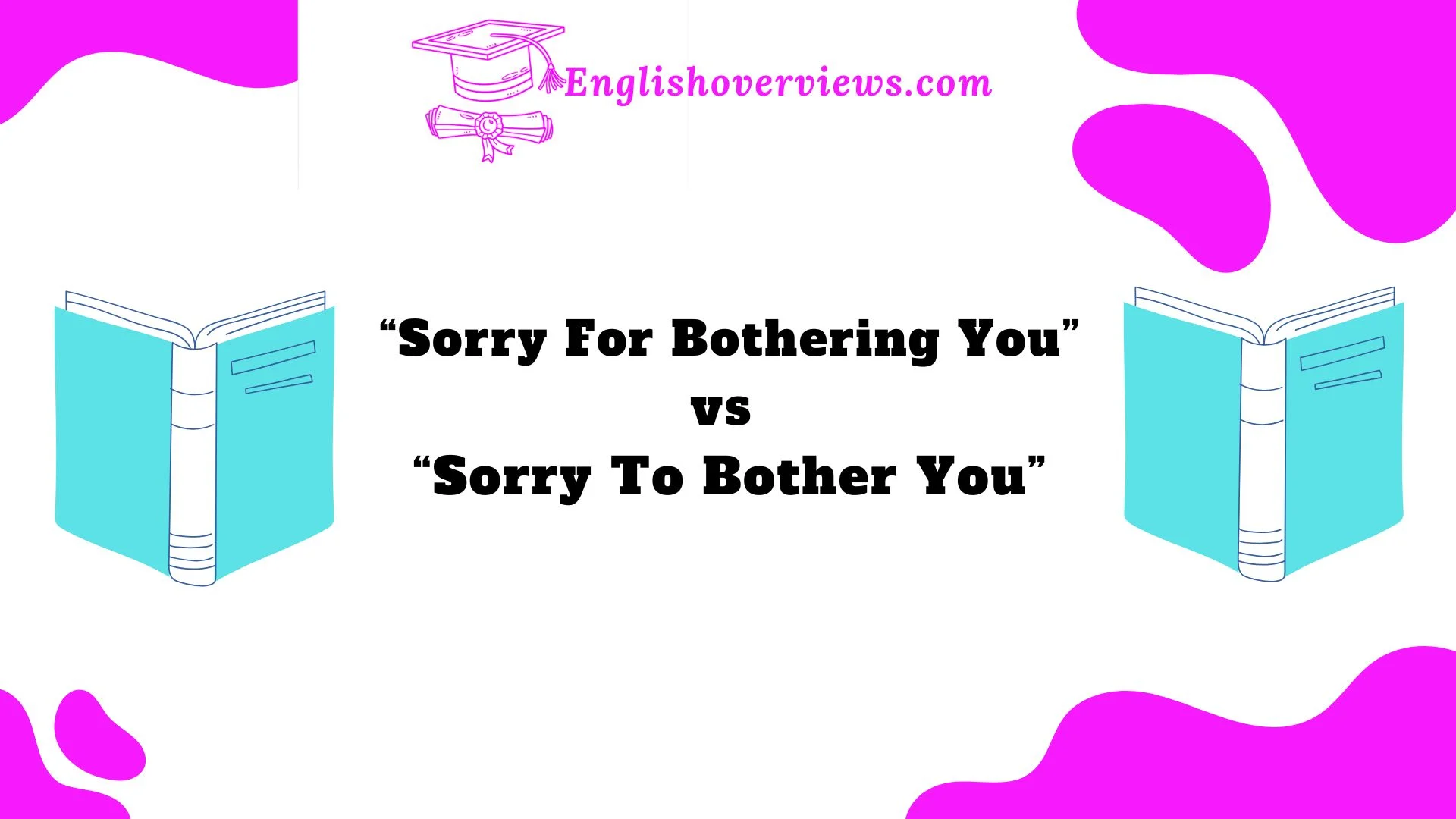Have you ever hesitated before apologizing in a message or conversation, wondering if you’re using the right phrase? The difference between “Sorry for bothering you” and “Sorry to bother you” may seem small, but it can impact how you’re perceived. In professional emails, casual conversations, or cross-cultural exchanges, choosing the correct phrase can set the tone for your communication.
This article dives deep into the nuances of these phrases. You’ll learn their specific meanings, when to use each, and how to strike the perfect balance between politeness and confidence. We’ll explore real-world examples, alternatives for various contexts, and even how cultural differences influence the way we apologize. By the end of this post, you’ll know exactly how to tailor your apologies to any situation.
Let’s begin by uncovering the subtle differences between these two commonly used phrases and explore their broader implications.
Breaking Down the Phrases: Meaning and Usage
“Sorry For Bothering You”
This phrase is often used to apologize for a past action that caused inconvenience. It’s reflective, implying the speaker is aware that they’ve interrupted or disturbed someone.
- Example: “Sorry for bothering you earlier, I should have checked your availability.”
- Best Used In:
- Follow-ups after requests.
- When acknowledging a previous interruption.
- Situations where you’ve already received help and want to show gratitude.
“Sorry To Bother You”
This phrase, on the other hand, is used before or during an interruption. It’s a polite way to initiate communication while acknowledging you might be inconveniencing the other person.
- Example: “Sorry to bother you, but could I ask for a quick update on the report?”
- Best Used In:
- Emails or messages initiating a request.
- Asking for clarification or assistance.
- Situations where you need to approach someone with tact.
Key Difference
- Timing: “Sorry for bothering you” refers to past actions, while “Sorry to bother you” is for present or future interactions.
- Tone: The former is reflective, the latter is preemptive.
Apologies in Communication: Balancing Politeness and Confidence
Why Over-Apologizing Can Undermine You
Repeatedly apologizing—especially for minor inconveniences—can make you seem less confident or overly self-critical. Research shows that over-apologizing diminishes authority in professional and personal settings.
- Case Study: A 2018 study by the University of Waterloo found that frequent apologies can signal a lack of competence, particularly in leadership roles.
When to Reframe Apologies
Instead of always apologizing, try reframing your message to focus on appreciation or solutions:
- Instead of: “Sorry to bother you, but could you help?”
- Say: “Thank you for your time, I’d appreciate your help with this.”
Professional Communication: Choosing the Right Apology
In professional settings, using the appropriate phrase can improve your tone and foster better relationships.
Email Etiquette
Politeness is key in emails, but avoid overusing apologies unnecessarily. For example:
- Over-apologetic: “Sorry to bother you, I know you’re busy, but I need help with this.”
- Polished and confident: “I hope this email finds you well. I’d appreciate your input on this issue.”
Professional Alternatives to “Sorry To Bother You” in Emails
| Situation | Better Phrase |
| Asking for feedback | “I’d value your insights on this.” |
| Requesting clarification | “Would you mind helping me understand this better?” |
| Following up on a task | “I wanted to follow up on this to ensure everything is on track.” |
Workplace Scenarios
Example 1: Team Collaboration
- “Sorry for bothering you earlier. Do you think we could review the draft again?”
Alternative: - “Thank you for your time earlier. Can we revisit the draft together?”
Example 2: Client Communication
- “Sorry to bother you, but could you provide the project details?”
Alternative: - “I appreciate your time. Could you share the project details at your convenience?”
Alternatives to “Sorry To Bother You”
Politeness doesn’t always require an apology. Here are some alternatives that maintain professionalism and respect:
Professional Alternatives
- “I appreciate your time.”
- “Would it be possible to…”
- “I hope I’m not interrupting.”
- “Could I trouble you for a moment?”
Casual Alternatives
- “Quick question for you.”
- “I wanted to check in about…”
- “If it’s not too much trouble…”
- “Just a quick follow-up.”
Conveying Sincerity Without Over-Apologizing
It’s important to show respect and sincerity without undermining your confidence. Here are some tips:
- Be Direct and Polite: Use clear language while maintaining a respectful tone.
- Instead of: “Sorry for bothering you, I was wondering if…”
- Say: “I wanted to reach out about…”
- Focus on Gratitude: Shift the emphasis from apology to appreciation.
- “Thank you for your patience with this.”
- Set Context Clearly: Provide context upfront to avoid sounding hesitant.
- “I’d like to discuss X because it impacts our timeline.”
The Role of Culture in Apologies
Cultural Differences in Apology Styles
Apologies are perceived differently across cultures. In some societies, apologizing is seen as a sign of humility, while in others, it might be viewed as unnecessary or even weak.
| Region | Apology Style |
| East Asia | Formal, hierarchical, emphasizes respect. |
| North America | Polite but less formal, often conversational. |
| Europe | Varies: Northern regions prefer directness, while Southern regions may use more tactful phrasing. |
Adapting for Cross-Cultural Communication
- Use neutral phrases when unsure about cultural norms: “I hope this isn’t inconvenient.”
- Observe how others in the culture phrase their messages and adapt accordingly.
FAQs
1. Is “Sorry To Bother You” more formal than “Sorry For Bothering You”?
Not necessarily. The formality depends on the context, but “Sorry To Bother You” is often used preemptively, making it more common in professional communication.
2. How can I avoid sounding overly apologetic in emails?
Focus on gratitude and clarity. Replace “Sorry” with “Thank you” or “I appreciate your time.”
3. Are there situations where apologizing is unnecessary?
Yes. If the inconvenience is minor or expected, it’s better to express gratitude or dive into the request confidently.
4. Are these phrases interchangeable?
They’re not interchangeable because “Sorry for bothering you” reflects on past actions, while “Sorry to bother you” prefaces a current or future action.
5. How do cultural norms affect apology phrasing?
Cultural norms dictate how apologies are received. For example, Japanese communication emphasizes humility, while Western cultures may prioritize efficiency and confidence.
Conclusion
The subtle differences between “Sorry for bothering you” and “Sorry to bother you” can greatly impact your communication’s effectiveness. Whether you’re crafting emails, asking for help, or navigating cultural norms, choosing the right phrase can convey professionalism, respect, and sincerity without over-apologizing.
By using the alternatives and strategies discussed here, you can build stronger connections while maintaining confidence in your tone. Remember, it’s not just about what you say—it’s how you say it.

Alyan Ashraf is the creative mind behind English Overviews, a platform dedicated to helping learners master the English language. Passionate about education and language development, Alyan specializes in simplifying complex English concepts, making learning accessible for students of all levels.











